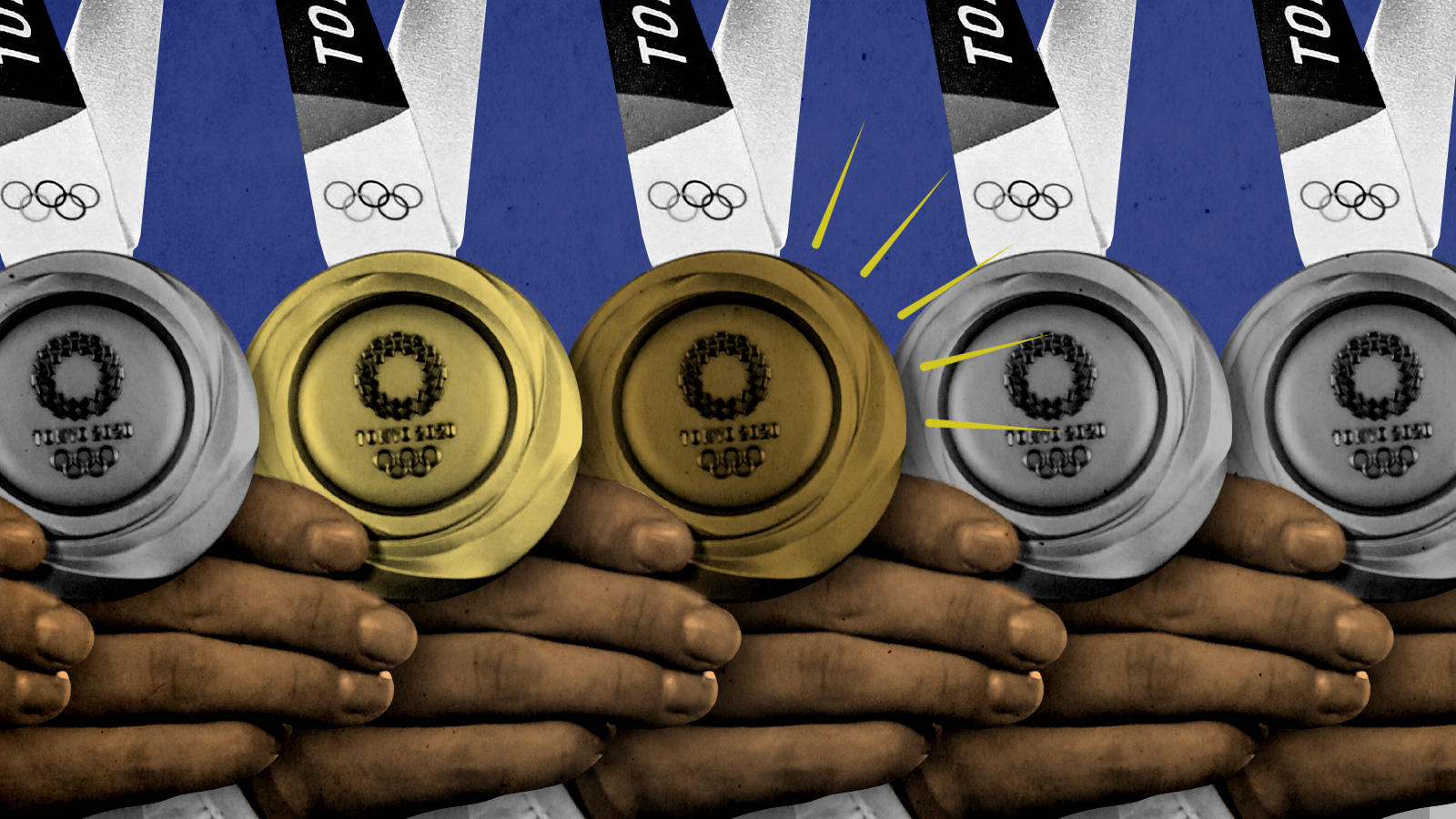In praise of third place
Let's be more excited about bronze medals


A free daily email with the biggest news stories of the day – and the best features from TheWeek.com
You are now subscribed
Your newsletter sign-up was successful
It is surprisingly tricky to actually answer "who's winning the Olympics?"
According to the official Olympic medal table, which is sorted by which nation has the most golds, the answer on Friday afternoon was China, with 19. But The New York Times organizes its medal table by overall count, giving every medal equal weight — which put the U.S. on top, with a combined 41.
But if you ask me, San Marino is the real winner of the 2020 Summer Olympics as we approach the midway point. The landlocked European microstate has only won one medal in Tokyo so far, which means you have to scroll to nearly the bottom of both the official Olympic medal table and The New York Times' summer Games page to find it on their lists. But when 33-year-old Alessandra Perilli won bronze in the women's trap shooting contest on Thursday, San Marino — a nation with only half the population of Portland, Maine — became the tiniest country to have ever medaled in the Olympics.
The Week
Escape your echo chamber. Get the facts behind the news, plus analysis from multiple perspectives.

Sign up for The Week's Free Newsletters
From our morning news briefing to a weekly Good News Newsletter, get the best of The Week delivered directly to your inbox.
From our morning news briefing to a weekly Good News Newsletter, get the best of The Week delivered directly to your inbox.

For perennial Olympic powerhouses like the United States, Russia, and especially China, the Sammarinese excitement over their bronze might seem a little … quaint. Enthusiasm stateside is almost exclusively reserved for our gold medalists, with all the attention during the 2020 Games so far centered on gymnast Suni Lee's all-around title, and the accomplishments of top swimmers Caeleb Dressel, Chase Kalisz, and Katie Ledecky. But while gold medals are obviously the pinnacle of achievement at the Games, bronze medalists, in particular, seem to be forgotten by their countrymen, as if coming in third in the world is somehow a shame — when in fact, third place is almost more exciting than first.
It's often said that bronze medalists are happier than silver medalists because the immediate runner-ups "tend to … think, 'Maybe if I had only done something different, I could have won that gold medal,'" Andrea Luangrath, a University of Iowa assistant marketing professor who's studied the phenomenon since 1995, told NPR. By contrast, competitors are usually grateful for their bronzes, knowing how close they potentially came to not medaling.
Additionally, the third-place spot is the likeliest to go to someone who might not have expected to place at all. That's part of what made the women's 400-meter freestyle relay bronze all the sweeter; going in, the U.S. had only finished fifth in the preliminaries, barely earning a spot in the finals, so any medal at all was far from a certainty. Likewise, Jagger Eaton, 20, wasn't the favorite in the men's street skateboarding competition, but wipeouts by fellow American and six-time world champion Nyjah Huston left him the opening to push into third place. Eaton joked he "blacked out" from the excitement of getting a medal — even if it didn't have the same prestige as gold or silver.
Still, there remains a pervasive sense that bronze is somehow shameful, or at the very least, not worthy of the same headlines as golds. In Thursday's women's 200-meter breaststroke, Americans Lilly King and Annie Lazor took second and third place respectively, behind South Africa's Tatjana Schoenmaker, who broke the world record; King, though, vented that to some in the U.S., the American women's finish would be considered a disappointment. "Pardon my French, but the fact that we're not able to celebrate silver and bronze is bulls---," she told Sports Illustrated, adding to Yahoo! Sports, "Just because we compete for the United States, and maybe we have extremely high standards for this sort of thing, that doesn't excuse the fact that we haven't been celebrating silver and bronze as much as gold."
A free daily email with the biggest news stories of the day – and the best features from TheWeek.com
While the Olympics represent the highest level of athletic competition in the world, in the end, they are still just a game. It's sad, then, to see athletes like Russian gymnast Nikita Nagornyy beat himself up for taking only third in the individual all-around. "I apologize," Nagornyy told Russian news agency Tass. "I feel very ashamed." What's downright pathetic, though, is when commentators dismiss bronze medals as shameful too, getting wrapped up in the arbitrary measures of national prowess. By perpetuating the narrative that only golds matter, though, then only wealthy nations with the resources to build gold-medal-winning teams will get any attention from the international press — philosophically, an insult to the spirit of the Games.
Ultimately all the graphs and number-crunching, the weighting of medals and projections don't mean a thing. No one "wins" the Olympics, at least not outside of a narrative spun by the media. Gold medals are pretty darn exciting, yes, but if you're only watching for Americans to top the podium, then you're missing out on what makes the Olympics so great.
Just ask all those revelers in San Marino: Sometimes "winning" is coming in third.
Jeva Lange was the executive editor at TheWeek.com. She formerly served as The Week's deputy editor and culture critic. She is also a contributor to Screen Slate, and her writing has appeared in The New York Daily News, The Awl, Vice, and Gothamist, among other publications. Jeva lives in New York City. Follow her on Twitter.
